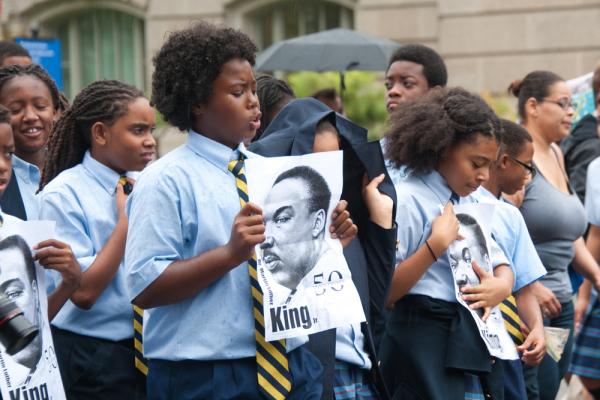As the nation recognizes the 50th anniversary of Martin Luther King Jr.’s assassination, we are poised at the threshold of a new national movement for racial justice that may or may not prove successful in fulfilling King’s ultimate vision.
As someone who lived in the South during the 1960s (my father was a reporter covering the civil rights movement when the KKK forced our family out of St. Augustine, Fla.) and who now teaches university students about racial issues, I am witnessing a revival of activism that has been dormant for a half century.
On April 4, 1968, King was gunned down on a motel balcony in Memphis, Tenn., while spearheading a strike by sanitation workers for better pay and safer conditions. The night before, he told the workers: “We've got to give ourselves to this struggle until the end. Nothing would be more tragic than to stop at this point in Memphis. We've got to see it through.”
Unfortunately, a survey of America today makes clear that we did not see the struggle through. Although many aspects of our society speak to the high-profile accomplishments and contributions by African Americans, my black students readily describe their painful experiences of driving and shopping while black, being taunted with racist remarks, and even turned away from white parties while my white students acknowledge being the only persons released by police when they and their black friends are detained for questioning.
Our country has witnessed three major attempts to rectify the racial injustices that slavery wrought. The first was a strong but unsuccessful drive by small farmers during the early 1800s to bar the importation of slaves as a means of curtailing the expansion of the South’s plantation system. Post-Civil War Reconstruction brought major advances for African Americans in the South. Mississippi had its first biracial election in 1867 and black voter registration outnumbered white registration. But the revival lasted only a decade before federal pressure waned and Jim Crow laws were eventually enacted.
King was only 26 when in 1955 he was recruited as a reluctant leader of the third major movement that ushered in national laws that altered every institution in America and changed the hearts and minds of many white Americans. Yet our subsequent lack of perseverance in enforcing those standards leaves us with a list of systemic institutional inequities: disparate funding and resegregation of schools, high incarceration rates among African Americans (five times that of whites), and a racial wealth gap (white families’ average wealth is seven times greater than black families’).
Today's fourth major movement reflects America’s changing landscape. By mid-century, whites will for the first time in the country’s history no longer be the majority. Instead, a collection of minorities – blacks, Latinos, Asians, Native Americans, and people of mixed race – will be the majority. The new faces of America are demanding change.
Their success remains to be seen. Today’s activism is loosely jointed with no single voice or leader issuing a clarion call for targeted action. King’s fiery speeches have been replaced by the tweets and social media feeds from a chorus of many voices. As one Black Lives Matter founder, Alicia Garza, stated, “The model of the black preacher leading people to the promised land isn’t working right now.”
Neither King nor his lieutenants could make claims on administrative efficiency, and civil rights groups splintered and lost steam after a successful voting rights campaign. But King was a brilliant strategist and public relations mastermind, focusing not simply on reacting to and opposing abuses but also on changing the national institutions and laws that created and perpetuated inequity.
King understood the power of gaining voting rights for black people, and the importance of electing representatives who could reverse systemic problems and alter public policies. That emphasis has not been lost on President Barack Obama, who garnered a greater proportion of votes from young black people than whites for the first time ever, and former U.S. Attorney General Eric Holder, who are working together for a fairer redistricting process.
Oftentimes, when I wonder about the future of today’s movement, I turn to my students as a barometer of prevailing trends. What would King tweet today were he alive? One student wrote, “Today we have to be more vigilant than ever before in protecting our character in the face of oppression. Those in control may yield the power to make policy, but where there is solidarity among everybody, no matter the race, there is hope for a future.”
Another wrote simply, “I have a dream, #tobecontinued.”
Got something to say about what you're reading? We value your feedback!






